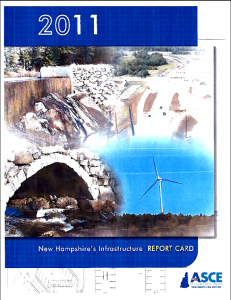 2011 Report Card for New Hampshire's Infrastructure
2011 Report Card for New Hampshire's InfrastructureOne does not have to look far to see that New Hampshire’s infrastructure directly affects your life – the roads you drive, the airlines and rail you travel, the water you drink, the lights you turn on in your home or office, a clean environment, or the schools your children attend. Civil engineers are responsible for planning, designing, constructing, and maintaining our infrastructure networks. They have the task of assuring that we live our lives with few if any inconveniences.
Read about New Hampshire's Infrastructure here.
 Aviation
Aviation Bridges
Bridges Dams
Dams Drinking Water
Drinking Water Energy
Energy Hazardous Waste
Hazardous Waste Inland Waterways
Inland Waterways Rail
Rail Roads
Roads Schools
Schools Solid Waste
Solid Waste Transit
Transit Wastewater
WastewaterA: Exceptional, B: Good, C: Mediocre, D: Poor, F: Failing, ?: Incomplete
Each category was evaluated on the basis of capacity, condition, funding, future need, operation and maintenance, public safety, resilience, and innovation
Aviation
15 public-use airports
Bridges
355 of the 2,438 bridges are structurally deficient
Bridges
$21.30 million in bridge funds came from the Federal Highway Bridge Fund in 2011
Dams
96% of the state regulated dams have an Emergency Action Plan
Dams
139 high hazard dams
Drinking Water
$847 million in drinking water infrastructure needs over the next 20 years
Energy
2.71 gigawatt-hours of renewable energy every year, ranking it 32nd
Hazardous Waste
20 sites on the National Priorities List
Inland Waterways
10 miles of inland waterways, ranking it 39th nationally
Levees
4 miles of levees
Ports
2.4 million short tons of cargo in 2012, ranking it 39th nationally
Public Parks
$103.3 million of unmet needs for its parks system
Rail
9 freight railroads covering 426 miles across the state, ranking 46th nationally by mileage
Roads
1,811 of the state’s 16,105 public roads are major roads, and 17% are in poor condition
Roads
$430.0 million a year in costs to motorists from driving on roads in need of repair, which is $404 /yr per motorist
Schools
$685.0 million in estimated school infrastructure funding needs
Transit
2.4 million annual unlinked passenger trips via transit systems including bus, transit, and commuter trains
Wastewater
$1.2 billion in wastewater infrastructure needs over the next 20 years

March 03, 2017
As the President’s repeated in his address to Congress his pledge to dramatically increase infrastructure spending to the tune of $1 trillion, various Congressional Committees

March 01, 2017
On Tuesday night, President Trump addressed a joint-session of Congress for the first time in his presidency. Infrastructure was among the many issues he discussed.

February 28, 2017
U.S. motorists set a new record for vehicle miles travelled (VMT) in 2016, driving over 3.2 trillion miles, an increase of 70 billion miles from

February 17, 2017
Romantic dates, the Grammy awards and celebrating black history are not the only milestones of this week; the Oroville dam crisis in California and the